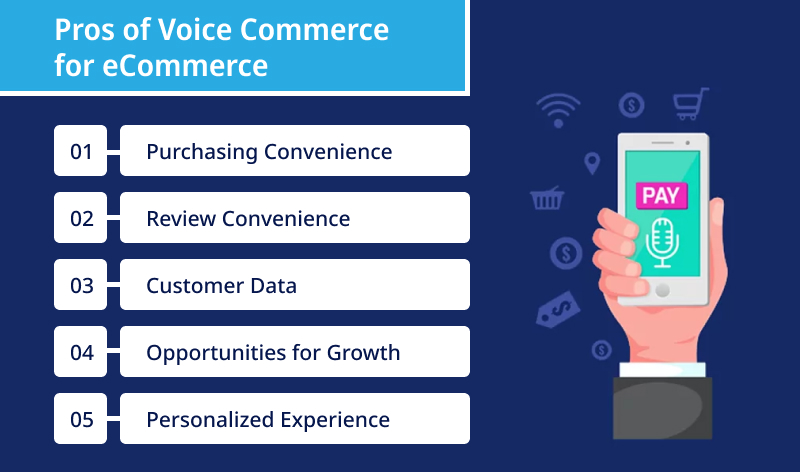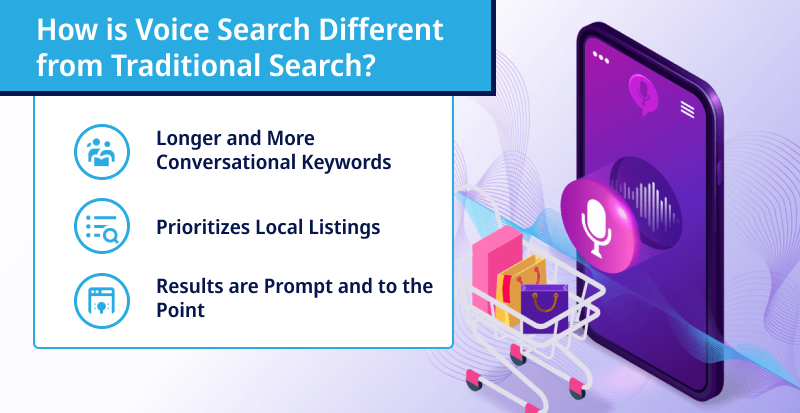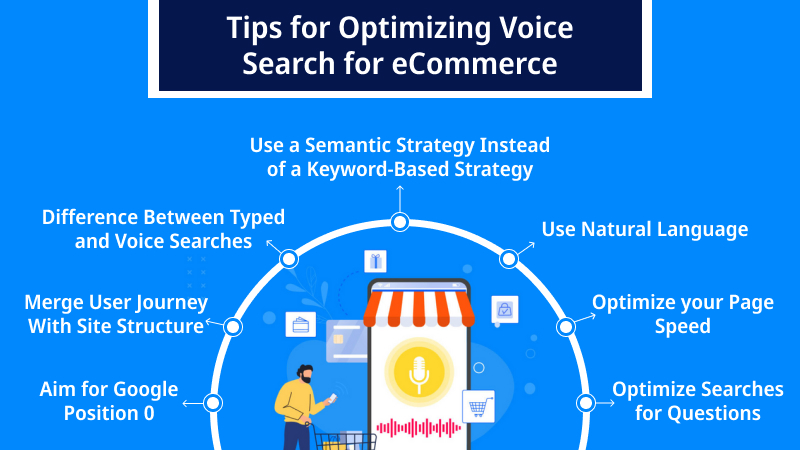Ever asked Alexa to play a movie or replenish your pantry? Wondered if your business could adopt this innovative customer service method or pondered the tech behind it? Welcome to the world of Voice Commerce.
Voice commerce is the fusion of voice-activated assistants and online shopping, allowing users to interact and transact with retailers without a screen or keyboard. In this blog post, we will learn more about the state of voice commerce today and how Voice Commerce is the future of eCommerce.
Table of Contents
Benefits of Voice Commerce for eCommerce
Here are the top benefits of Voice Commerce for your eCommerce business:
Purchase Convenience: Your clients no longer need to go through the checkout process on your website. Instead, people only need to say a few words to buy your goods or services.
Customers benefit significantly from the ease of purchasing because it spares them from a drawn-out checkout process. As per Jupiter Research, there will likely be 13.5 billion active smart home devices by 2025.
While voice commerce on smart speakers will be popular, it won’t be long until your customers are given even more convenience.
A smartwatch, the dashboard of a car, and many more interfaces will be often used to make purchases. The shopping procedure will only become simpler with technological advancements.
Review Convenience: As per a study, 64% of polled consumers said ratings and reviews were significant when purchasing. However, it can be challenging to get your consumers to provide reviews.
Voice-based commerce streamlines the procedure. You can ask your clients for reviews; they only need to speak a few words to register it. Customers can write lengthy reviews more easily as a result of this ease. You’ll have more testimonials to utilize as social proof and more input to help you better your goods and services in the future.
Customer Data: You can customize marketing, offer deals, and cross-sell related products to enhance conversions if you have accurate consumer data. Your consumers’ preferences for products, purchasing frequency, and add-on goods can all give you valuable information about what they need and when they need it.
According to research by Accenture, 91% of consumers were more willing to patronize firms that offered useful discounts and suggestions. Customers will want to purchase more if they see their experience as more customized.
The more purchasing information you have, the more individualized your brand experience may be. By opening a portal to that information, voice commerce makes it quicker and simpler to get.
Opportunities for Growth: Since voice commerce is still new, there is potential for new businesses to enter the sector, which firms like Amazon currently dominate. You must develop a “skill” (used for Amazon devices) or an “action” (used for Google devices) to use voice commerce.
For example, when Starbucks partnered with Alibaba and their smart speaker Tmall Genie, customers could buy coffee for delivery through a smart speaker and get customized product recommendations. For a true coffee shop experience, they also made Starbucks’s in-store playlist streamable on Tmall Genie. Starbucks has demonstrated that it is possible to use voice commerce technologies while immersing customers in a brand experience, even if it is only available to customers in China.
Personalized Experience: Nowadays, personalization is a key aspect of the customer experience. Customers want customized purchasing experiences, and 76% complain that a one-size-fits-all service irritates them. With voice shopping, eCommerce customers can have a completely customized buying experience.
Voice shopping has become possible because of the ability of voice assistants to preserve purchase histories. Using this data, voice assistants can suggest additional products to customers that they find interesting. Voice commerce can thereby enhance the customer experience.
Discover our solutions to boost your digital strategy. Contact us for a voice commerce upgrade?
What Makes Voice Search Different From Traditional Search?
A few distinctions exist between using the voice search feature and a standard manual search. Additionally, it has various benefits for the consumer and any company using voice search technology.
It can be easy to implement a voice search option for your eCommerce site and can assist marketers in making that decision if they know the differences.
-
Longer and More Conversational Keywords
The terms and phrases you employ while conducting voice and standard searches differ significantly. To discover a reputable dealership, you might use simple terms like “Jeep Wrangler,” “New,” and “Newark,” but you could also use more complicated queries like “What are the best deals on a Jeep Wrangler in the Newark area?”
Using longer search terms naturally requires a slightly different SEO approach focusing on long-tail keywords. To improve your voice search SEO strategy and attract customers to your website, especially for inquiries concerning pricing or location, it is essential to consider what keywords may appear in a voice search.
-
Prioritizes Local Listings
According to Bright Local, 58% of people in the US who used voice search did so to find a nearby company. 74% of the 58% who had done so had done so at least once every week. Thus, if you have optimized it to concentrate on the geographical features of your business location, a voice local search can promote your company.
Let’s return to the instance of looking for a new Jeep Wrangler. You want to draw clients to your Jeep dealership. Your first location keyword might be New Jersey. Nevertheless, despite being one of the smallest states in the area, NJ is home to approximately 10 million people. Thus, adding more specific markers like “Newark” and your district (Fairmount) becomes more focused and benefits users.
-
Results are Prompt and to the Point
Convenience and quickness are two of a voice search’s key selling features. Therefore, results are intended to be presented understandably, with the most pertinent results appearing at the top of the page. One of the causes is the possibility that users multitask when performing a voice search.
For instance, a Google voice search yields results comparable to those of traditional searches but are quicker and probably provide a more exact response. The voice search results are frequently read aloud for your convenience.
Also Read: Unlocking eCommerce Success: Selecting The Right Architecture For Your Business
7 Tips to Optimize Voice Search for eCommerce
Here are the 7 tips for optimizing voice search for eCommerce to help you achieve your vision of seeing your firm expand and perform successfully.
Aim for Google Position 0
You most likely currently perform SEO optimization for online marketing and traditional searches. Therefore, you are well aware of the struggle for Google Position 0. When this happens, Google chooses informational snippets to be featured and posts them in a box at the top of any search results, increasing traffic to your website and, ideally, increasing the likelihood that that traffic will become paying customers.
Difference Between Typed and Voice Searches
Voice searches can be very different from typed searches. A voice search is more likely to be easy and conversational, and people may often pose a question as they would in real life, whereas people may just use three or four words when conducting a typed search. The question “Where can I find the best deals on Jeep Wranglers in Newark?” might be asked using voice search.
But there are other variations you should be conscious of and consider while creating your plan:
- Device and Search Engine: While many voice searches are conducted on mobile devices, the use of smart speaker systems is growing. You might instinctively assume that Google Home is the leading search engine. Since most smart speakers utilize Bing as well as Alexa and Cortana, the Microsoft virtual assistant, Bing may become more significant to companies seeking to rank highly. Bing is working on both Android phones and iPhones.
- Subject: People are still utilizing traditional searches for topics like healthcare, even if voice searches are frequently used for ‘local’ topics. So, think about what you are offering or selling. If you fall into the traditional category, it doesn’t mean you should disregard voice search because you know how quickly things may change.
Wondering how to dominate voice search rankings? Improve your online visibility with our expertise
Use a Semantic Strategy Instead of a Keyword-Based Strategy
Semantic SEO’s primary objective is to emphasize topics that could come up in voice searches more than on traditional keywords. This necessitates considering potential voice search circumstances, phrase associations, and prospective customer intent (to buy a new car).
The basic idea behind semantic search is that people will search differently when speaking than when typing. It is also closely related to Google’s Hummingbird search algorithm update from 2013 that prioritizes meaning, context, and natural language over the previous keyword-focused approach. Additionally, that algorithm gives your site’s total content greater weight.
Merge User Journey With Site Structure
As has always been, you want to offer a simple and positive user journey and experience, and voice searches are no exception. Even though the goal is the same, the trip is very different. Consolidating the voice search user’s journey may require structural adjustments or improvements to your website.
Also, consider the advantages of link-building SEO and how it can work with your new strategy as you examine these aspects.
- Navigation: Make sure the navigation on your eCommerce site corresponds to the standard inquiry string for voice searches.
- Schema: Your existing structured data gains depth by adding schema markup. Then, you might inform the appropriate search engines about special occasions, fresh merchandise, price cuts, etc.
- XML: An XML sitemap that consumers can quickly travel through while enabling the same functionality for search engines is ideal. This enables quick access to any pertinent information in answer to a query.
Create voice-friendly content and address queries effectively. Get started today.
Use Natural Language
By this point, you should know the potential variations between a voice search and a typed search. Any voice search strategy must take this into account. However, it’s not just about a basic voice or type change; it’s also about realizing that customers might even express the “same” query using different words.
When dealing with a market the size of the USA, you must be aware that some products may have various names depending on the location. As an illustration, if you were selling shoes online, some nations may refer to a specific shoe design as a “sneaker,” while other regions might call them “tennis shoes.” If selling nationally, you need to utilize both phrases to reach clients.
Optimize your Page Speed
Whether conducting traditional or voice searches, page speed is an important consideration. People anticipate having easy access to information. As a result, if your website and pages load slowly, customers can choose to visit another site. If your page loads slowly, search engines won’t be able to swiftly get the information they need to rank your site highly.
Ensuring your landing pages are optimized for manual and voice searches will become more crucial. If you don’t have an IT team that can handle this task, you have two options: either use Google to find problems (and fix them) or outsource the entire project to a company.
Optimize Searches for Questions
So now you know that individuals phrase voice searches very differently than they phrase typed searches. Instead of using a “chain” of keywords, a voice search will be more conversational and more likely to be framed as a question. A user may ask, “Where can I buy a new Jeep Wrangler in Newark?” if conducting a voice search.
This must be considered when optimizing for voice searches and how they phrase their queries. You want to provide thoughtful, pertinent responses when customers ask voice search queries. Direct responses increase visitors to your website and potentially lower churn rates.
The Future of Voice Commerce
Despite the uncertainties, the future of voice commerce enjoys high customer satisfaction. As per Shopify, 80% of those who have used voice assistants to make purchases said they were happy with the process.
Given these numbers and the quick advancements in artificial intelligence in 2023, voice commerce appears to be on track to become a more significant part of the economy.
Retailers must pay attention to voice commerce because it will play a bigger part in your online sales and customer service strategy.
How can PixelCrayons Help in Your eCommerce Business?
PixelCrayons is your strategic partner in unleashing the full potential of your eCommerce business. Our eCommerce development services cover the entire spectrum and have a history of success. We can turn your concept into a digital reality that connects with your audience, from creating appealing user interfaces to incorporating cutting-edge functionalities.
Our team of seasoned specialists is knowledgeable about the most recent developments in technology and eCommerce. Whether creating a brand-new online store or improving your current platform, we provide specialized solutions catering to your business needs. We empower your eCommerce business to flourish digitally through its blend of creativity, technical expertise, and commitment to your success. Connect with us to understand more about our eCommerce web design services.
Final Words
Voice commerce can raise your online business to new heights. You need to know how voice commands operate, their benefits, and any potential difficulties you might encounter when embracing this trend.
It is already revolutionizing the shopping experience, eventually leading to unlimited possibilities. Remember our main recommendations: put some effort into your online business, use voice shopping, and stay competitive.
You can also opt for professional eCommerce Consulting Services to understand it better for your retail business.
Tap into more than 80% satisfaction rate with our voice commerce solutions.
FAQs
Why is Voice Commerce considered the future of eCommerce?
Voice Commerce is like having your personal shopping assistant right in your home. It’s super convenient, especially when you are busy, or your hands are full. Plus, it feels more natural, like chatting with a friend who knows exactly what you want. It makes the future of eCommerce shopping a breeze; companies are catching onto this to improve your experience.
How secure is Voice Commerce for making online purchases?
Safety is a big deal, especially when you’re shopping online. The good news is companies are working hard to keep your voice purchases safe. They use encryption (fancy word for super-strong codes) to protect your info, just like when you shop on websites.
Also, many voice assistants need a special code or your biometric details (fancy for your unique traits like your fingerprint) to confirm it’s really you making the purchase. So, while nothing is totally foolproof, they’re doing their best to secure your shopping adventures.
What are the advantages of voice search eCommerce?
Voice search eCommerce is like having a super-smart shopping buddy. It’s lightning fast – you just say what you want, and bam, there it is. No more typing on tiny screens! Plus, it’s hands-free, which is awesome when cooking, driving, or lounging around. Voice search also gets to know you better, suggesting things you’ll love. It’s a game-changer for people who might find typing tricky, like seniors or folks with disabilities. All in all, it’s a tech-savvy way to shop that’s all about you!







